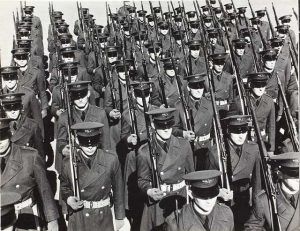The Phony War, also known as the “Sitzkrieg” or “Drôle de guerre,” marked a curious and relatively quiet period at the onset of World War II. Beginning after the German invasion of Poland in September 1939, this phase extended until the Battle of France in May 1940. Despite the ominous backdrop of escalating tensions and mobilized forces, the Western Front experienced a lack of major military engagements during this time.

The term “Phony War” itself encapsulates the essence of this period – a strange interlude characterized by a lack of decisive battles and large-scale offensives. It was a time of anticipation, as the world held its breath, waiting for the storm of conflict that everyone knew was inevitable.
One of the contributing factors to the Phony War was the swift and brutal invasion of Poland by Nazi Germany. The invasion demonstrated the effectiveness of Blitzkrieg tactics, showcasing the speed and coordination with which German forces could operate. The Polish campaign was over in a matter of weeks, leaving the Allies in a state of shock and uncertainty about the future course of the war.
As the Allies, primarily represented by France and the United Kingdom, mobilized their forces, there was an expectation that the Western Front would become the primary theater of action. However, to the surprise of many, the front remained relatively quiet. Military operations were limited, and both sides seemed to be cautiously watching and waiting.
The Phony War was not devoid of activity, but the engagements that did occur were relatively small-scale and inconclusive. There were sporadic clashes along the Maginot Line, a fortified defensive line along the French-German border. Skirmishes also took place at sea, where British and German naval forces encountered each other, but no decisive naval battles ensued.
The lack of significant military action during the Phony War led to a sense of surrealism on the home fronts. Civilians in France and Britain, aware of the impending threat, experienced a mixture of anxiety and anticipation. Governments undertook extensive propaganda campaigns to maintain morale, but the absence of major battles created an atmosphere of uncertainty.
The Phony War came to an abrupt end with the launch of the German Blitzkrieg against France and the Low Countries in May 1940. The rapid and overwhelming German offensive shattered the illusion of a prolonged quiet period. The Battle of France unfolded, leading to the fall of France and the evacuation of British forces from Dunkirk.
In retrospect, the Phony War serves as a crucial chapter in the early stages of World War II. It highlights the strategic miscalculations of the Allies, who expected a more static and defensive conflict. The term itself captures the sense of disbelief and confusion that characterized this period, reminding us that even in the calm before the storm, the undercurrents of war were ever-present.
As we reflect on the Phony War, it stands as a cautionary tale about the unpredictability of conflict and the challenges of anticipating the strategies employed by adversaries. While the term may imply a lack of substance, the Phony War played a pivotal role in shaping the dynamics of the larger conflict that would unfold in the years to come.
Cite This Article
"The Phony War: What Was it and Why Does It Matter?" History on the Net© 2000-2024, Salem Media.
April 27, 2024 <https://www.historyonthenet.com/the-phony-war-what-was-it-and-why-does-it-matter>
More Citation Information.

